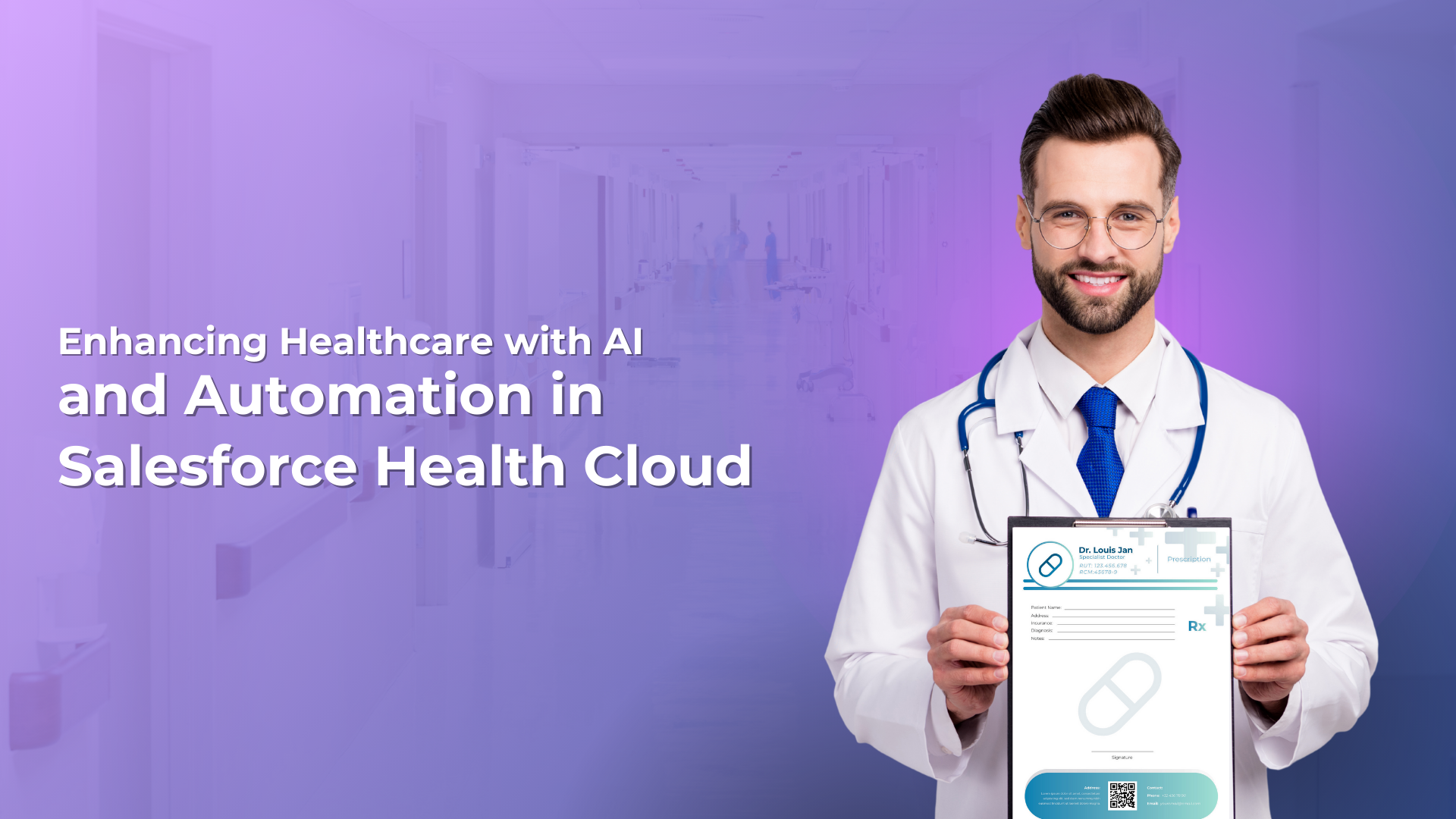
Salesforce Health Cloud is changing healthcare by using AI and automation to simplify patient data management and enhance care. This article will show how these tools, including Salesforce and healthcare solutions, make healthcare operations more efficient and patient care more personalized.
Introduction
In today’s healthcare landscape, the significance of AI and automation cannot be overstated. These technologies are driving a paradigm shift, enabling healthcare providers to deliver more precise, efficient, and personalized care. The integration of AI and automation into healthcare systems promises to reduce administrative burdens, enhance patient outcomes, and streamline operations.
Salesforce Health Cloud emerges as a crucial player in this transformation. Salesforce Health Cloud utilizes AI and automation to offer a comprehensive solution to the complex challenges healthcare providers face. From managing patient data to predicting health outcomes, Salesforce Health Cloud is paving the way for a smarter, more efficient healthcare system.
As we delve deeper into this blog post, we will explore how Salesforce Health Cloud leverages AI and automation to revolutionize patient care. We will examine the key features of Salesforce Health Cloud, the role of AI in enhancing its capabilities, and how automation can streamline healthcare processes. Join us on this journey as we uncover the immense potential of AI and automation in transforming healthcare.
Understanding Salesforce Health Cloud
Salesforce Health Cloud is a cutting-edge platform designed to transform the way healthcare providers manage patient care. At its core, Salesforce Health Cloud integrates various data sources, providing a unified view of each patient. This comprehensive approach enables healthcare providers to deliver personalized and proactive care, improving patient outcomes and satisfaction.
One of the key features of Salesforce Health Cloud is its ability to seamlessly integrate with existing healthcare systems. This integration ensures that healthcare providers have access to real-time, accurate patient data, enabling them to make informed decisions quickly. Additionally, Salesforce Health Cloud offers robust analytics capabilities, allowing healthcare providers to identify trends and patterns that can inform treatment plans and improve patient care.
Moreover, Salesforce Health Cloud is built on the Salesforce platform, which means it benefits from the extensive ecosystem of Salesforce tools and applications. This integration allows healthcare providers to leverage advanced technologies such as Salesforce Einstein, Salesforce’s AI platform, to enhance patient care and streamline operations. Salesforce Health Cloud stands at the forefront of digital transformation in healthcare through its comprehensive, integrated solution.
How Does AI Enhance Salesforce Health Cloud?
Artificial intelligence (AI) plays a pivotal role in enhancing the capabilities of Salesforce Health Cloud. By integrating ai cloud into the platform, Salesforce Health Cloud can provide healthcare providers with powerful tools to improve patient care and streamline operations. One of the primary ways AI enhances Salesforce Health Cloud is through predictive analytics. By analyzing vast amounts of data, AI can identify patterns and trends that predict patient outcomes, enabling healthcare providers to intervene proactively.
Salesforce Health Cloud leverages AI-driven tools such as Salesforce Einstein to deliver these predictive insights. For instance, AI-powered predictive analytics can help healthcare providers identify patients at risk of developing chronic conditions, enabling early intervention and personalized care plans. Additionally, AI can analyze patient data to recommend treatment options, ensuring that patients receive the most effective care possible.
Furthermore, Salesforce Health Cloud offers a range of AI-driven tools designed to enhance patient care. These tools include conversational AI assistants that can interact with patients, answer their questions, and provide support. Leveraging AI capabilities, Salesforce Health Cloud allows healthcare providers to deliver personalized, efficient, and proactive care, enhancing patient outcomes and satisfaction.
How Can Automation Improve Healthcare Processes?
Automation is another key component of Salesforce Health Cloud, offering numerous benefits for healthcare providers. Automating repetitive and time-consuming tasks allows Salesforce Health Cloud to free up healthcare providers, enabling them to focus on delivering high-quality patient care. One of the primary benefits of automation is the reduction of administrative burdens and reduced costs. Tasks such as scheduling appointments, managing patient records, and processing claims can be automated, freeing up valuable time for healthcare providers and reducing the risk of errors.
Salesforce Health Cloud offers a range of automation tools designed to streamline healthcare processes. For example, robotic process automation (RPA) can automate routine tasks such as data entry, ensuring that patient records are accurate and up-to-date. Additionally, automation tools can automatically generate reports and alerts, providing healthcare providers with real-time insights into patient care and operations.
Automation also plays a crucial role in improving accuracy and efficiency in patient management. Automating data entry and other repetitive tasks reduces errors and ensures patient data accuracy and consistency in Salesforce Health Cloud. This improved accuracy enables healthcare providers to make better-informed decisions, ultimately enhancing patient care and outcomes.
How Can AI and Automation Work Together in Salesforce Health Cloud?
The combination of AI and automation in Salesforce Health Cloud creates a powerful synergy that enhances patient care and streamlines healthcare operations. Integrating AI insights with automated workflows enables Salesforce Health Cloud to help healthcare providers deliver more personalized and efficient care. For example, AI can analyze patient data to identify potential health risks, while automation can trigger alerts and schedule follow-up appointments, ensuring timely intervention.
One of the key benefits of combining AI and automation is the ability to provide personalized care at scale. AI-driven insights can inform treatment plans and care recommendations, while automation ensures that these plans are implemented consistently and efficiently. This combination enables healthcare providers to deliver high-quality care to a larger number of patients, improving overall patient outcomes and satisfaction.
Additionally, AI and automation can improve patient engagement and care coordination. A conversational AI assistant can interact with patients, answer their questions, and provide support, while automation tools can manage appointment scheduling and follow-up reminders. This integrated approach ensures that patients receive the care they need when they need it, ultimately enhancing patient satisfaction and outcomes.
What’s Next for AI and Automation in Healthcare?
The future of AI and automation in healthcare is incredibly promising, with emerging trends and innovations set to revolutionize the industry. Emerging generative AI capabilities, like Salesforce Einstein Copilot, have the potential to assist with patient interactions and care recommendations under provider supervision.
Additionally, the healthcare industry is seeing rapid advancements in AI technologies such as machine learning and natural language processing. These technologies enable more accurate and efficient analysis of patient data, providing healthcare providers with deeper insights and more precise predictions. As AI continues to evolve, we can expect even more sophisticated tools and applications to emerge, further enhancing patient care and operational efficiency.
Salesforce Health Cloud is at the forefront of these innovations, continually evolving to incorporate the latest AI and automation technologies. Future enhancements to Salesforce Health Cloud are expected to include more advanced AI-driven analytics, improved automation capabilities, and enhanced integration with other healthcare systems. These innovations will ensure that healthcare providers can continue to deliver high-quality, efficient, and personalized care to their patients.
Conclusion
Investing in AI and automation is no longer optional for healthcare providers; it is essential for staying competitive and delivering high-quality care. Salesforce Health Cloud offers a powerful platform that integrates AI and automation to transform patient care and streamline operations. Leveraging these technologies allows healthcare providers to improve patient outcomes, reduce costs, and enhance efficiency.
Salesforce Health Cloud provides healthcare organizations with the tools they need to stay ahead in a rapidly evolving industry. From predictive analytics to automated workflows, Salesforce Health Cloud ensures that healthcare providers have access to the latest technologies and insights. This comprehensive solution allows healthcare providers to deliver personalized, proactive care, ultimately enhancing patient satisfaction and outcomes.
In conclusion, the integration of AI and automation into Salesforce Health Cloud represents a significant step forward for the healthcare industry. By harnessing the power of these technologies, healthcare providers can deliver smarter, more efficient, and more personalized care, ensuring better outcomes for patients and greater operational efficiency.
To take your healthcare digital transformation even further, consider partnering with Selah Digital. As a trusted leader in Salesforce services, Selah Digital specializes in leveraging Salesforce Health Cloud to drive innovation and efficiency in the healthcare sector. Their expert team is dedicated to crafting tailored solutions that meet your unique needs, ensuring you stay at the forefront of the digital revolution while delivering exceptional patient care.
Frequently Asked Questions
How does Salesforce Health Cloud integrate with existing healthcare systems?
Salesforce Health Cloud integrates with existing healthcare systems by supporting FHIR and HL7 interoperability standards, enabling seamless data exchange between EHRs, patient management systems, and other healthcare platforms. To facilitate secure and efficient integrations, Salesforce leverages Mulesoft’s API-led connectivity, allowing organizations to connect disparate systems while maintaining compliance with HIPAA, HITRUST, and GDPR regulations. Built-in security features such as data encryption, access controls, and audit logs ensure patient data privacy and regulatory compliance. By providing real-time, secure access to patient data, Salesforce Health Cloud enhances care coordination, improves patient outcomes, and streamlines healthcare operations.
What are the benefits of AI-powered predictive analytics in patient care?
AI-powered predictive analytics enhances patient care by identifying patterns that allow for proactive interventions, leading to improved patient outcomes and satisfaction. This technology enables personalized care tailored to individual needs.
How can automation reduce administrative burdens in healthcare?
Automation significantly reduces administrative burdens in healthcare by efficiently managing repetitive tasks like appointment scheduling, patient record maintenance, and claims processing. This allows healthcare providers to dedicate more time to patient care while minimizing the likelihood of errors.
How do AI and automation work together in Salesforce Health Cloud?
AI and automation in Salesforce Health Cloud collaborate to improve patient care by merging AI insights with automated workflows, enhancing personalization, engagement, and timely interventions. This integration ultimately leads to better health outcomes.
What future innovations can we expect in Salesforce Health Cloud?
Future innovations in Salesforce Health Cloud will likely involve advanced AI-driven analytics, enhanced automation, and tighter integration with other healthcare systems, ultimately improving the delivery of personalized patient care.


